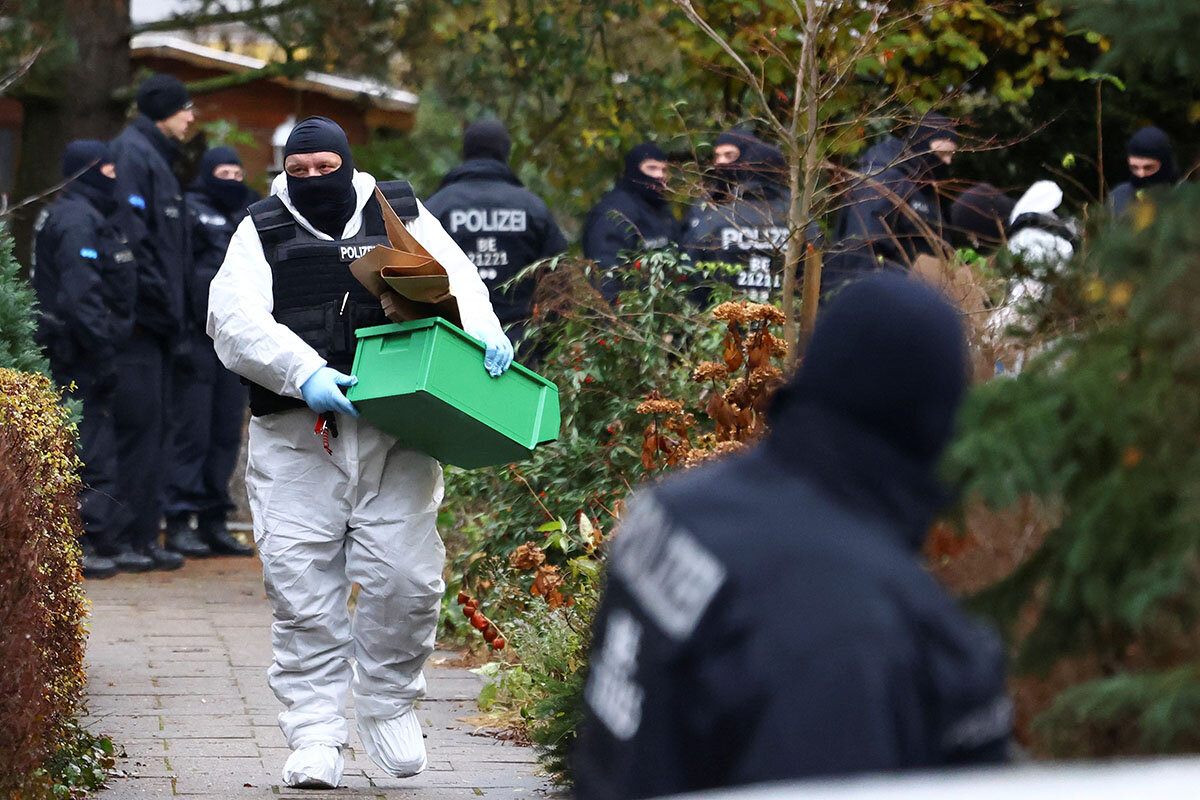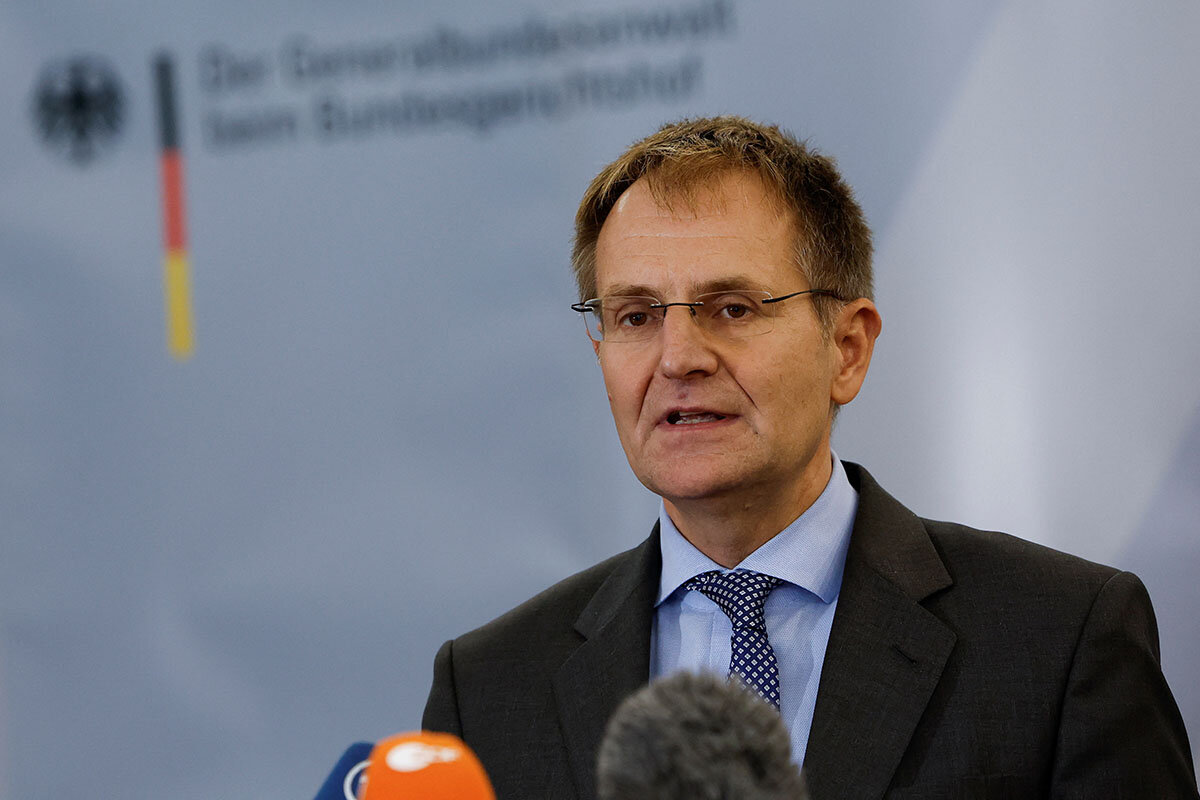‘Protecting our democracy’: German police foil alleged coup plot
Loading...
| Berlin
German police conducted the largest operation in postwar history on Wednesday, staging over 130 raids on suspected terrorist-linked properties and arresting 25 people, some with military training, alleged to be involved in a plot to violently overthrow the government.
The group was linked to QAnon and the Reichsbürger movement, which embraces “deep state” theories and advocates a return to the Hitlerian Reich. Led by a minor German aristocrat, the group intended to force its way into the Bundestag and install a new government, according to prosecutors.
Why We Wrote This
German police say they have forestalled an extreme right-wing coup plot. How deeply has such antidemocratic thinking permeated the military?
Wednesday’s raids, involving officials from 11 German states, were the latest in a series of efforts by the authorities to rid the security forces of neo-Nazis. The scale of the investigation demonstrated how serious a threat the authorities believe the extremist group posed, as well as the long arm of Germany’s democratic institutions.
“What’s troubling about today is you have aspiration coupled with operational abilities such as skill and access to weaponry,” says Steve Hewitt, a security and counterterrorism expert at the University of Birmingham in England.
The raids “are reassuring on one hand,” says Professor Hewitt, “but on the other hand it’s worrying because what else is out there?”
German police conducted the largest operation in their postwar history on Wednesday, staging over 130 raids on suspected terrorist-linked properties and arresting 25 people alleged to be involved in a plot to violently overthrow the government.
“The investigation will foremost give us a clear picture of how far along the coup planning actually was,” German Interior Minister Nancy Faeser said in a statement.
But the authorities held such strong suspicions about the target group’s “violent steps to carry out its action, that the Federal Court of Justice ordered investigative measures,” Justice Minister Marco Buschmann tweeted.
Why We Wrote This
German police say they have forestalled an extreme right-wing coup plot. How deeply has such antidemocratic thinking permeated the military?
The group was linked to QAnon and the Reichsbürger movement, a far-right fringe group that embraces “deep state” theories and advocates a return to the pre-World War II German Reich. Led by a minor German aristocrat named Heinrich XIII Prince Reuss, the group intended to force its way into the Bundestag and install a new government, according to federal prosecutors.
Some of those arrested appear to be ex-military personnel, and federal investigators said that the group tried to contact the Russian government. All those arrested were German nationals, save one Russian.
“Militant Reichsbürger are united by their hatred of democracy, our state, and those who work for our well-being,” said Ms. Faeser. “That’s why we will use all legal tools at our disposal, and we will use them because it’s about protecting our democracy.”
“Aspiration plus operational abilities”
Wednesday’s raids were the latest in a series of efforts by the authorities to rid the security forces of neo-Nazis. The arrest of an army officer, now serving a five-year prison term for plotting the overthrow of the government, revealed widespread penetration of the military by far-right militants.
The Reichsbürger were armed, and had accepted that there would be deaths in their bid to “achieve systemic change at all levels,” according to a statement by German prosecutors. One of the accused is a former elected official, and the locations searched in Wednesday’s raids included barracks belonging to the KSK, a special forces unit previously linked to far-right terrorism. Another 27 suspects are under further investigation.
The scale of the investigation and ensuing raids, which involved multiple federal agencies and officials from 11 German states, demonstrated how serious a threat the authorities believe the extremist group posed, as well as the long arm of Germany’s democratic institutions.
“What’s troubling about today is you have aspiration coupled with operational abilities such as skill and access to weaponry,” says Steve Hewitt, a security expert at the University of Birmingham in England.
The raids “are reassuring on one hand,” says Dr. Hewitt, “but on the other hand it’s worrying because what else is out there? People have always had extreme ideas and conspiracy theories, but the internet’s reach, spread, and speed makes it more dangerous than when someone had their own printing press and handed out street flyers.”
Defensive democracy
Germany’s dark history has instilled an ardent modern desire to prevent the rise of another Adolf Hitler.
The constitution forged after World War II, corresponding security provisions, and modern-day legislation give the German government unusual power to investigate domestic extremist threats in the name of preserving democracy. The laws and rules that comprise Germany’s “defensive democracy” limit individual freedoms in the name of protecting the state.
For example, suspected extremist political parties in Germany can be monitored and surveilled or even declared unconstitutional, rendering them unable to carry out basic functions such as fundraising. Several German states have put the far-right political party Alternative for Germany under state surveillance, and a 2022 ruling classified the party as right-wing extremist and potentially subject to monitoring, even though it holds 78 seats in parliament.
“In the U.S. you [must] pose an immediate threat to someone or something ... but in Germany parties can be banned even if they are not preparing violent crimes,” says Fabian Virchow, head of a research unit studying far-right extremism at the University of Applied Sciences in Dusseldorf. “That, of course, is part of what Germany has experienced with the Nazi regime, and lessons learned.”
Germany’s security services also regularly investigate suspected far-right extremism inside military and police units. In 2020, Germany’s Defense minister dismantled a unit of the KSK after investigators found an underground bunker filled with Nazi artifacts and pilfered ammunition on a member’s property.
That same year, the German military reported missing more than 62 kilograms of explosives and 60,000 rounds of ammunition. Another 48,000 rounds had disappeared from the special forces units. Further, the security services identified over 1,400 suspected cases of far-right extremism among soldiers, police officers, and intelligence officers in the three years leading up to 2020.
In one of the highest-profile cases of far-right infiltration, a former lieutenant in the German army known as Franco A. was sentenced to five and a half years in prison last July. He was an active soldier when he was discovered to be hoarding ammunition and plotting to bring down the German state; his case revealed a network of far-right threats that permeated German security agencies at all levels.
In 2019, the centre-right politician Walter Lübcke was assassinated on his doorstep by a neo-Nazi. Earlier, in 2011, a series of long-unsolved murders of immigrants was discovered to be the work of the National Socialist Underground, a neo-Nazi terrorist group with suspected police and security agency links. Then-Chancellor Angela Merkel said investigation of the murders had uncovered “structures that we never imagined.”
The alleged plot uncovered on Wednesday may reach further than is immediately clear, says Dr. Hewitt, the counterterrorism expert.
“It’s similar to the United States, where you had the Republican Party and some elements playing footsie with the Capitol rioters,” he says. “There will be questions about links between political parties and those involved in the plots. This is a question for democracy, whether there are actual political parties that don’t believe in democratic systems.”










